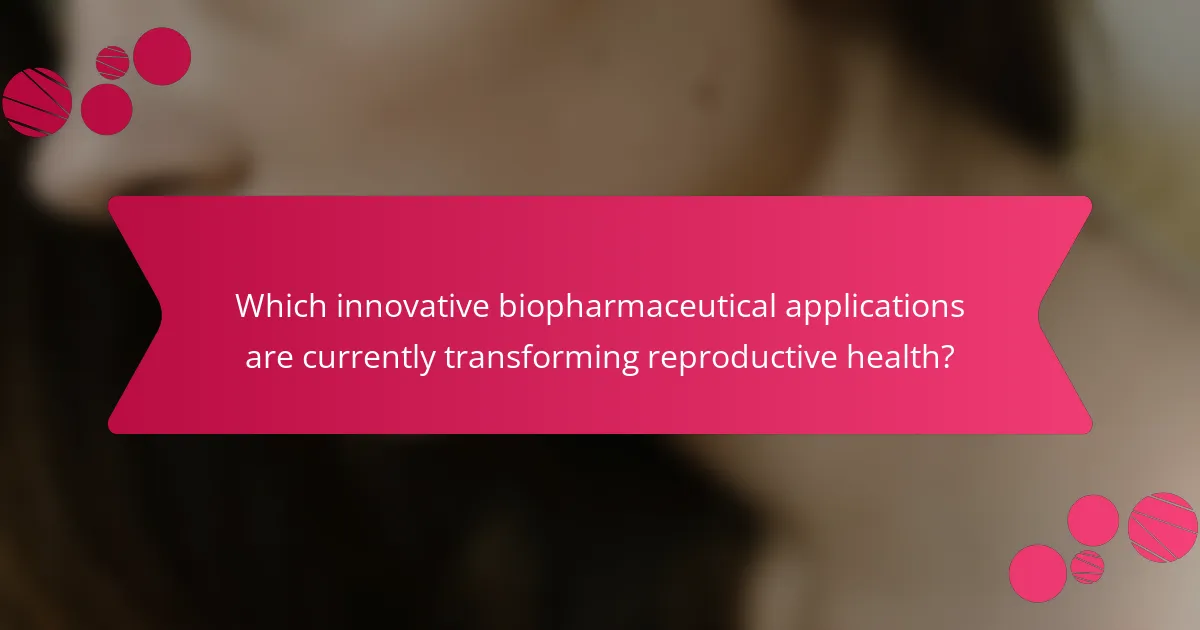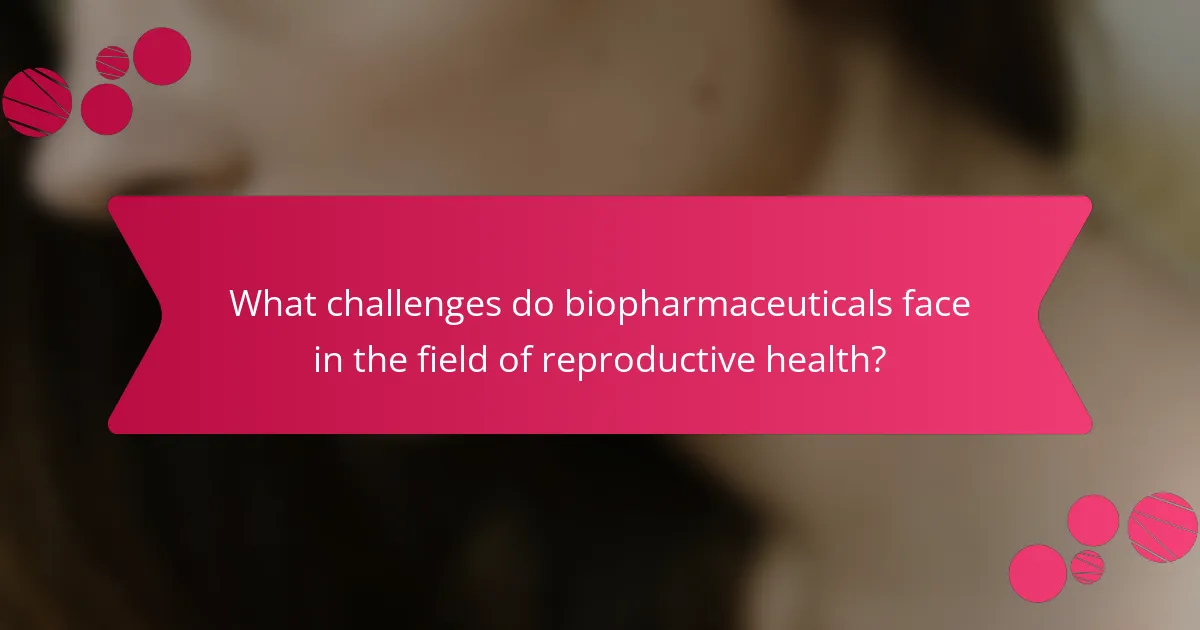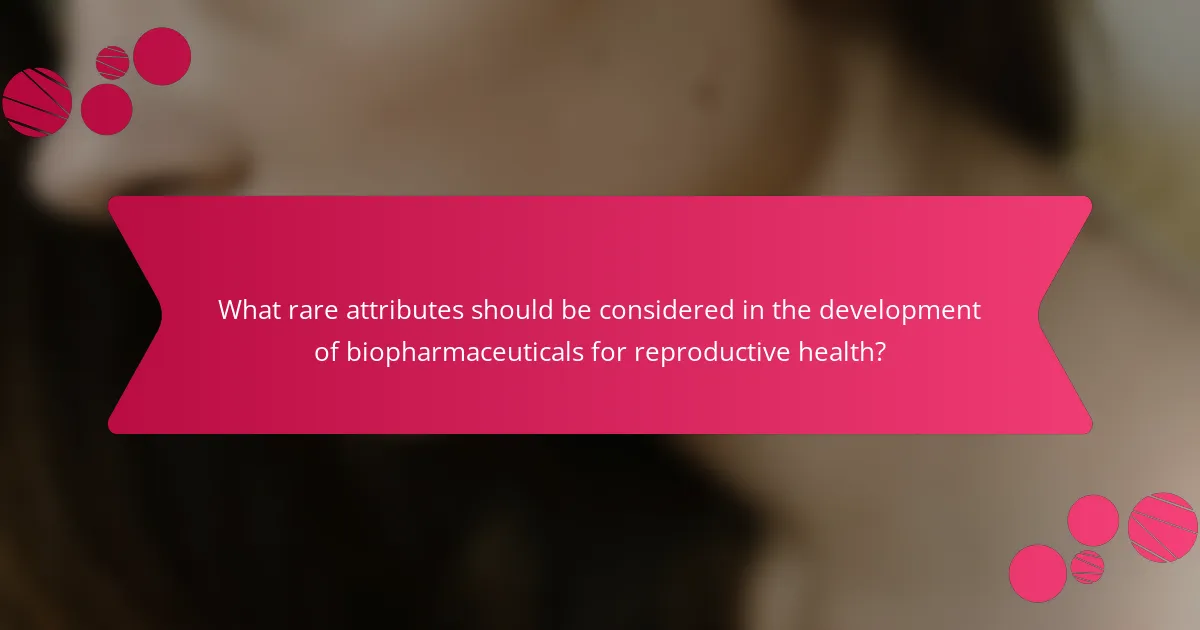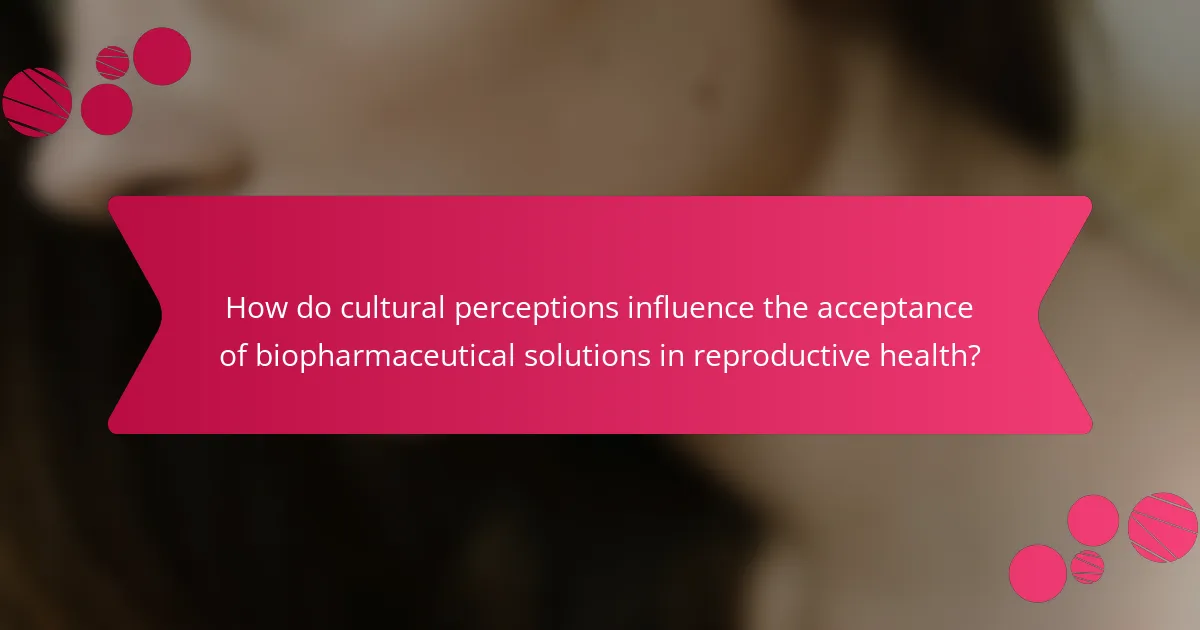Innovative biopharmaceutical solutions significantly enhance reproductive health by improving treatment efficacy and personalising therapies. They target specific hormonal pathways and leverage advanced technologies to effectively address complex reproductive disorders. These solutions include gene therapy, hormone therapies, and targeted drug delivery systems, promising better patient outcomes. Ongoing research aims to expand treatment options, paving the way for breakthroughs in reproductive health management.

What are the key benefits of innovative biopharmaceutical solutions for reproductive health?
Innovative biopharmaceutical solutions provide significant benefits for reproductive health, including improved treatment efficacy, personalised therapies, and enhanced patient outcomes. These solutions leverage advanced technologies to address complex reproductive disorders effectively.
One key benefit is the ability to target specific hormonal pathways, leading to more effective interventions in conditions like infertility or hormonal imbalances. For example, targeted therapies can reduce side effects associated with traditional treatments.
Additionally, biopharmaceutical innovations enable the development of personalised medicine approaches, allowing treatments to be tailored to individual genetic profiles, thus improving success rates.
Finally, ongoing research in this field promises to expand treatment options, potentially leading to breakthroughs in reproductive health management, including safer contraceptives and advanced fertility treatments.
How do these solutions improve fertility rates?
Innovative biopharmaceutical solutions significantly enhance fertility rates through targeted therapies and improved reproductive health. These solutions address hormonal imbalances, optimise ovarian function, and increase sperm quality. For instance, advanced medications can regulate menstrual cycles and stimulate ovulation, leading to higher conception rates. Additionally, personalised treatment plans cater to individual needs, maximising efficacy and outcomes. As a result, couples facing infertility can experience renewed hope and increased chances of successful pregnancies.
What role do they play in managing reproductive disorders?
Innovative biopharmaceutical solutions play a crucial role in managing reproductive disorders by targeting underlying causes and improving patient outcomes. These solutions offer precision therapies that address hormonal imbalances, enhance fertility, and support reproductive health. For example, advancements in gene therapy and personalised medicine provide tailored treatments that can significantly reduce the time to conception and improve success rates in assisted reproductive technologies. As a result, these innovations not only alleviate symptoms but also promote long-term reproductive health.
How can they enhance patient quality of life?
Innovative biopharmaceutical solutions significantly enhance patient quality of life in reproductive health. These advancements provide effective treatments, reduce side effects, and improve overall health outcomes. For example, targeted therapies can alleviate symptoms of reproductive disorders, leading to increased emotional well-being. As a result, patients experience improved fertility rates and greater satisfaction with their treatment journey.

Which innovative biopharmaceutical applications are currently transforming reproductive health?
Innovative biopharmaceutical applications are significantly enhancing reproductive health through gene therapy, hormone therapies, and targeted drug delivery systems. These advancements improve fertility treatments and address reproductive disorders effectively.
Gene therapy offers potential solutions for genetic reproductive issues, allowing for the correction of inherited disorders. Hormone therapies are revolutionising treatments for conditions like polycystic ovary syndrome and menopause, providing tailored solutions that enhance quality of life. Targeted drug delivery systems ensure that medications reach the specific sites of action, minimising side effects and maximising efficacy in reproductive health treatments.
The future of reproductive health will likely include personalised medicine, utilising genetic insights to customise therapies further. Enhanced research and development in biopharmaceuticals will continue to transform reproductive health, offering hope for improved outcomes.
What advancements are being made in hormonal therapies?
Innovations in hormonal therapies include personalised treatments and advanced delivery systems. Recent advancements focus on bioidentical hormones, which closely mimic natural hormones, enhancing efficacy and reducing side effects. Additionally, novel formulations allow for more precise dosing and improved patient compliance. Research is ongoing into gene therapy and regenerative medicine to further enhance reproductive health outcomes.
How are gene editing technologies being utilized in reproductive health?
Gene editing technologies are revolutionising reproductive health by enhancing fertility treatments and preventing genetic disorders. These technologies, such as CRISPR, allow precise modifications to genes, enabling the correction of mutations that cause hereditary diseases. For instance, gene editing can be applied to embryos to eliminate conditions like cystic fibrosis or sickle cell anaemia, significantly improving health outcomes.
Additionally, gene editing aids in the development of personalised medicine approaches in reproductive health. This means treatments can be tailored to the genetic profile of individuals, improving efficacy and reducing side effects. As a result, the integration of gene editing in reproductive health is leading to innovative biopharmaceutical solutions that promise better reproductive outcomes.
Future directions include expanding the applications of gene editing in assisted reproductive technologies, such as in vitro fertilisation. Researchers are exploring how these technologies can enhance embryo selection processes, ensuring healthier pregnancies. The ongoing advancements in gene editing hold great potential for addressing complex reproductive health challenges.
What are the emerging trends in personalised medicine for reproductive issues?
Emerging trends in personalised medicine for reproductive issues focus on tailored therapies and genetic insights. These innovations enhance treatment efficacy and minimise side effects.
One significant trend is the use of genomic profiling to customise fertility treatments. This approach allows healthcare providers to identify specific genetic markers that influence reproductive health, leading to more effective interventions.
Another trend is the integration of artificial intelligence in reproductive health. AI algorithms analyse vast datasets to predict outcomes and recommend personalised treatment plans, improving success rates in assisted reproductive technologies.
Additionally, advancements in biopharmaceuticals are creating targeted therapies for conditions like endometriosis and polycystic ovary syndrome. These treatments aim to address the root causes rather than just symptoms, offering patients better long-term health outcomes.

What challenges do biopharmaceuticals face in the field of reproductive health?
Biopharmaceuticals in reproductive health face challenges such as regulatory hurdles, high development costs, and limited market access. These barriers hinder innovation and patient access to novel therapies. Additionally, the complexity of reproductive health conditions complicates clinical trials, impacting the speed of product development. Addressing these challenges requires collaborative efforts among stakeholders to streamline processes and enhance funding opportunities.
How do regulatory hurdles impact innovation?
Regulatory hurdles significantly slow down innovation in biopharmaceutical solutions for reproductive health. These obstacles can delay product development, increase costs, and limit market access. For instance, lengthy approval processes can hinder timely access to innovative treatments, impacting patient care. Moreover, stringent regulations may discourage investment in research and development, stifling advancements in reproductive health solutions. As a result, navigating these regulatory landscapes is crucial for fostering innovation and ensuring the availability of effective therapies.
What are the common misconceptions about biopharmaceutical treatments?
Many misconceptions exist about biopharmaceutical treatments for reproductive health. Some believe these treatments are only for severe conditions, while they can also address mild issues. Others think they are ineffective compared to traditional methods, yet research shows they often provide superior outcomes. A common myth is that biopharmaceuticals are unsafe; however, they undergo rigorous testing to ensure safety and efficacy. Additionally, some individuals assume these treatments are prohibitively expensive, but many are covered by insurance or provide cost-effective solutions. Lastly, a misconception is that biopharmaceuticals are a temporary fix; in reality, they can lead to long-term health improvements.
How do cost and accessibility affect patient adoption?
Cost and accessibility significantly influence patient adoption of innovative biopharmaceutical solutions for reproductive health. High costs may deter patients from seeking necessary treatments, while improved accessibility can enhance adoption rates.
Research indicates that when treatments are affordable and easily accessible, patients are more likely to engage with innovative solutions. For instance, programs that reduce out-of-pocket expenses have shown increased patient enrollment in clinical trials.
Moreover, geographical factors play a role; patients in urban areas often have better access to cutting-edge therapies compared to those in rural regions. As a result, addressing these disparities is essential for maximising the benefits of biopharmaceutical advancements.
Ultimately, a focus on reducing costs and enhancing accessibility can lead to higher patient adoption rates, ensuring that more individuals benefit from advancements in reproductive health.

What unique attributes distinguish specific biopharmaceutical solutions for reproductive health?
Specific biopharmaceutical solutions for reproductive health are distinguished by their personalised treatment approaches, innovative delivery systems, and targeted mechanisms of action. These unique attributes enhance efficacy and minimise side effects. For instance, some solutions utilise gene therapy to address genetic disorders affecting fertility, while others employ nanotechnology to improve drug absorption and delivery. Additionally, advancements in biologics offer tailored therapies that respond to individual patient needs, marking a significant shift towards precision medicine in reproductive health.
How do certain treatments target specific genetic markers?
Certain treatments target specific genetic markers by utilising advanced biopharmaceutical technologies that enhance reproductive health. These treatments are designed to identify and interact with unique genetic profiles, enabling personalised therapeutic approaches. For instance, gene editing techniques can correct mutations in reproductive cells, improving outcomes for individuals with genetic disorders. Additionally, targeted therapies can modulate gene expression, addressing conditions such as infertility linked to specific genetic variations. This innovative approach holds promise for future applications in reproductive medicine, paving the way for more effective and tailored treatments.
What differentiates biologics from traditional pharmaceuticals in this field?
Biologics differ from traditional pharmaceuticals primarily in their complexity and production methods. Biologics are derived from living organisms and consist of large, complex molecules, while traditional pharmaceuticals are typically small, chemically synthesised compounds. Biologics can target specific pathways in reproductive health, offering personalised treatment options, unlike many traditional drugs that have broader effects. This precision can lead to improved efficacy and fewer side effects in reproductive health applications.

What rare attributes should be considered in the development of biopharmaceuticals for reproductive health?
Rare attributes in biopharmaceutical development for reproductive health include targeted delivery mechanisms, personalised medicine approaches, and biomarker integration. These factors enhance treatment efficacy and patient outcomes. For instance, targeted delivery can improve drug localisation, minimising side effects. Personalised medicine tailors therapies to individual genetic profiles, increasing success rates. Biomarker integration allows for real-time monitoring of treatment responses, facilitating timely adjustments. These attributes are essential for advancing innovative solutions in reproductive health.
How can novel delivery methods enhance treatment efficacy?
Novel delivery methods significantly enhance treatment efficacy by improving drug absorption and targeting. These methods can increase bioavailability, reduce side effects, and enhance patient adherence. For instance, nanoparticle-based systems allow for controlled release, ensuring that therapeutic agents reach their intended site effectively. As a result, innovative biopharmaceutical solutions can lead to more successful outcomes in reproductive health treatments.
What are the implications of breakthrough therapies on future research?
Breakthrough therapies significantly influence future research by accelerating innovation and targeting previously untreatable conditions. These therapies enhance understanding of reproductive health, leading to improved treatment options. For instance, gene editing and personalised medicine may reshape clinical practices. As a result, ongoing research will likely focus on integrating advanced technologies and optimising therapeutic outcomes. This evolution could establish new standards in reproductive health care, driving further investment and collaboration in the biopharmaceutical sector.

How do cultural perceptions influence the acceptance of biopharmaceutical solutions in reproductive health?
Cultural perceptions significantly shape the acceptance of biopharmaceutical solutions in reproductive health. Societal beliefs and values influence attitudes towards medical innovations, impacting their integration into healthcare systems.
For instance, in cultures that prioritise traditional medicine, there may be scepticism towards biopharmaceuticals, which could hinder their adoption. Conversely, societies that value scientific advancements may embrace these solutions more readily.
Education plays a crucial role in altering perceptions. Increased awareness about the benefits of biopharmaceuticals, such as higher efficacy and fewer side effects, can enhance acceptance.
Moreover, ethical considerations and religious beliefs can create barriers or promote acceptance, depending on how biopharmaceuticals align with cultural values. Understanding these dynamics is essential for successful implementation in diverse populations.
What regional differences exist in the adoption of these innovations?
Regional differences in the adoption of innovative biopharmaceutical solutions for reproductive health are significant. Developed regions, such as North America and Western Europe, show higher adoption rates due to robust healthcare infrastructure and funding. In contrast, developing regions face challenges like limited access to healthcare and regulatory hurdles, which slow down adoption.
Cultural attitudes toward reproductive health also vary, influencing the acceptance of these innovations. For example, in some regions, stigma around reproductive health issues can hinder the uptake of biopharmaceutical solutions. Additionally, education and awareness levels differ, impacting how innovations are perceived and utilised.
Economic factors play a crucial role as well. Regions with higher healthcare spending are more likely to invest in and adopt new technologies. Conversely, areas with constrained budgets may prioritise essential healthcare services over innovative solutions.
Overall, the adoption of biopharmaceutical innovations in reproductive health is influenced by a complex interplay of infrastructure, cultural attitudes, education, and economic conditions.
How do societal attitudes towards reproductive health shape treatment options?
Societal attitudes towards reproductive health significantly influence treatment options by shaping access, research funding, and policy development. Positive attitudes foster innovation in biopharmaceutical solutions, enhancing patient care. For instance, increased awareness leads to greater investment in reproductive health therapies, such as hormonal treatments and fertility drugs. Conversely, stigma can limit research opportunities and restrict treatment availability. As a result, societal perceptions directly impact the landscape of reproductive health solutions, guiding both current applications and future advancements.

What are the future directions for innovative biopharmaceutical solutions in reproductive health?
Innovative biopharmaceutical solutions in reproductive health are focusing on personalised treatments and advanced technologies. Future directions include gene editing, targeted therapies, and regenerative medicine. These innovations aim to enhance fertility, address hormonal disorders, and improve maternal health outcomes. As a result, they promise to revolutionise reproductive health management and patient care.
Which technological advancements are expected to emerge by 2025?
Innovative biopharmaceutical solutions for reproductive health are expected to advance significantly by 2025. Key developments include personalised medicine approaches, enhanced fertility treatments, and novel contraceptive methods. These innovations aim to improve patient outcomes and expand treatment accessibility. Additionally, advancements in gene editing and regenerative medicine will play crucial roles in addressing reproductive health challenges.
How can collaboration between stakeholders drive progress?
Collaboration between stakeholders can significantly drive progress in innovative biopharmaceutical solutions for reproductive health. By combining expertise, resources, and perspectives, stakeholders can enhance research and development efforts, leading to more effective treatments.
For example, partnerships between pharmaceutical companies and academic institutions can accelerate the discovery of new therapies. Collaborative initiatives can also facilitate regulatory navigation, ensuring that innovative solutions reach the market efficiently. As a result, these synergies can improve patient outcomes and expand access to reproductive health solutions.
Moreover, stakeholder engagement fosters a holistic approach, integrating patient feedback into the development process. This ensures that the solutions address real-world needs, ultimately driving progress in reproductive health.
What best practices can be implemented to optimize treatment outcomes?
Implementing best practices like personalised treatment plans and continuous monitoring can significantly optimise treatment outcomes in reproductive health. Utilizing innovative biopharmaceutical solutions enhances efficacy and reduces side effects. Collaboration among healthcare providers ensures comprehensive care, addressing various patient needs. Regularly updating protocols based on emerging research leads to improved methodologies and outcomes.
